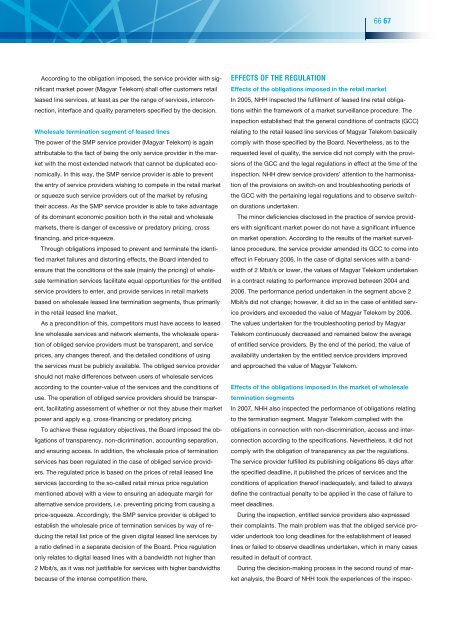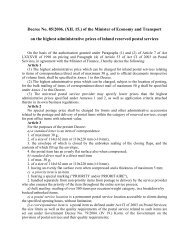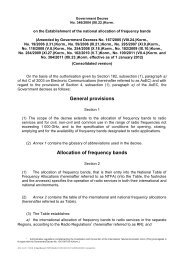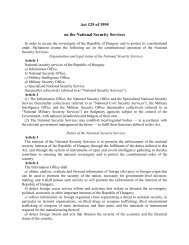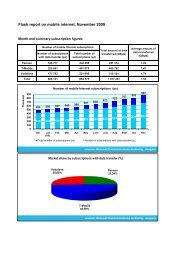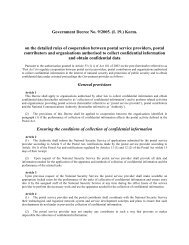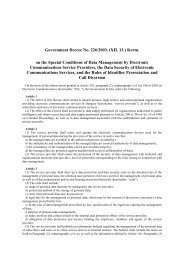The Hungarian Communications Market Developments and ...
The Hungarian Communications Market Developments and ...
The Hungarian Communications Market Developments and ...
You also want an ePaper? Increase the reach of your titles
YUMPU automatically turns print PDFs into web optimized ePapers that Google loves.
66 67<br />
According to the obligation imposed, the service provider with significant<br />
market power (Magyar Telekom) shall offer customers retail<br />
leased line services, at least as per the range of services, interconnection,<br />
interface <strong>and</strong> quality parameters specified by the decision.<br />
Wholesale termination segment of leased lines<br />
<strong>The</strong> power of the SMP service provider (Magyar Telekom) is again<br />
attributable to the fact of being the only service provider in the market<br />
with the most extended network that cannot be duplicated economically.<br />
In this way, the SMP service provider is able to prevent<br />
the entry of service providers wishing to compete in the retail market<br />
or squeeze such service providers out of the market by refusing<br />
their access. As the SMP service provider is able to take advantage<br />
of its dominant economic position both in the retail <strong>and</strong> wholesale<br />
markets, there is danger of excessive or predatory pricing, cross<br />
financing, <strong>and</strong> price-squeeze.<br />
Through obligations imposed to prevent <strong>and</strong> terminate the identified<br />
market failures <strong>and</strong> distorting effects, the Board intended to<br />
ensure that the conditions of the sale (mainly the pricing) of wholesale<br />
termination services facilitate equal opportunities for the entitled<br />
service providers to enter, <strong>and</strong> provide services in retail markets<br />
based on wholesale leased line termination segments, thus primarily<br />
in the retail leased line market.<br />
As a precondition of this, competitors must have access to leased<br />
line wholesale services <strong>and</strong> network elements, the wholesale operation<br />
of obliged service providers must be transparent, <strong>and</strong> service<br />
prices, any changes thereof, <strong>and</strong> the detailed conditions of using<br />
the services must be publicly available. <strong>The</strong> obliged service provider<br />
should not make differences between users of wholesale services<br />
according to the counter-value of the services <strong>and</strong> the conditions of<br />
use. <strong>The</strong> operation of obliged service providers should be transparent,<br />
facilitating assessment of whether or not they abuse their market<br />
power <strong>and</strong> apply e.g. cross-financing or predatory pricing.<br />
To achieve these regulatory objectives, the Board imposed the obligations<br />
of transparency, non-dicrimination, accounting separation,<br />
<strong>and</strong> ensuring access. In addition, the wholesale price of termination<br />
services has been regulated in the case of obliged service providers.<br />
<strong>The</strong> regulated price is based on the prices of retail leased line<br />
services (according to the so-called retail minus price regulation<br />
mentioned above) with a view to ensuring an adequate margin for<br />
alternative service providers, i.e. preventing pricing from causing a<br />
price-squeeze. Accordingly, the SMP service provider is obliged to<br />
establish the wholesale price of termination services by way of reducing<br />
the retail list price of the given digital leased line services by<br />
a ratio defined in a separate decision of the Board. Price regulation<br />
only relates to digital leased lines with a b<strong>and</strong>width not higher than<br />
2 Mbit/s, as it was not justifiable for services with higher b<strong>and</strong>widths<br />
because of the intense competition there.<br />
Effects of the regulation<br />
Effects of the obligations imposed in the retail market<br />
In 2005, NHH inspected the fulfilment of leased line retail obligations<br />
within the framework of a market surveillance procedure. <strong>The</strong><br />
inspection established that the general conditions of contracts (GCC)<br />
relating to the retail leased line services of Magyar Telekom basically<br />
comply with those specified by the Board. Nevertheless, as to the<br />
requested level of quality, the service did not comply with the provisions<br />
of the GCC <strong>and</strong> the legal regulations in effect at the time of the<br />
inspection. NHH drew service providers’ attention to the harmonisation<br />
of the provisions on switch-on <strong>and</strong> troubleshooting periods of<br />
the GCC with the pertaining legal regulations <strong>and</strong> to observe switchon<br />
durations undertaken.<br />
<strong>The</strong> minor deficiencies disclosed in the practice of service providers<br />
with significant market power do not have a significant influence<br />
on market operation. According to the results of the market surveillance<br />
procedure, the service provider amended its GCC to come into<br />
effect in February 2006. In the case of digital services with a b<strong>and</strong>width<br />
of 2 Mbit/s or lower, the values of Magyar Telekom undertaken<br />
in a contract relating to performance improved between 2004 <strong>and</strong><br />
2006. <strong>The</strong> performance period undertaken in the segment above 2<br />
Mbit/s did not change; however, it did so in the case of entitled service<br />
providers <strong>and</strong> exceeded the value of Magyar Telekom by 2006.<br />
<strong>The</strong> values undertaken for the troubleshooting period by Magyar<br />
Telekom continuously decreased <strong>and</strong> remained below the average<br />
of entitled service providers. By the end of the period, the value of<br />
availability undertaken by the entitled service providers improved<br />
<strong>and</strong> approached the value of Magyar Telekom.<br />
Effects of the obligations imposed in the market of wholesale<br />
termination segments<br />
In 2007, NHH also inspected the performance of obligations relating<br />
to the termination segment. Magyar Telekom complied with the<br />
obligations in connection with non-discrimination, access <strong>and</strong> interconnection<br />
according to the specifications. Nevertheless, it did not<br />
comply with the obligation of transparency as per the regulations.<br />
<strong>The</strong> service provider fulfilled its publishing obligations 85 days after<br />
the specified deadline, it published the prices of services <strong>and</strong> the<br />
conditions of application thereof inadequately, <strong>and</strong> failed to always<br />
define the contractual penalty to be applied in the case of failure to<br />
meet deadlines.<br />
During the inspection, entitled service providers also expressed<br />
their complaints. <strong>The</strong> main problem was that the obliged service provider<br />
undertook too long deadlines for the establishment of leased<br />
lines or failed to observe deadlines undertaken, which in many cases<br />
resulted in default of contract.<br />
During the decision-making process in the second round of market<br />
analysis, the Board of NHH took the experiences of the inspec-


